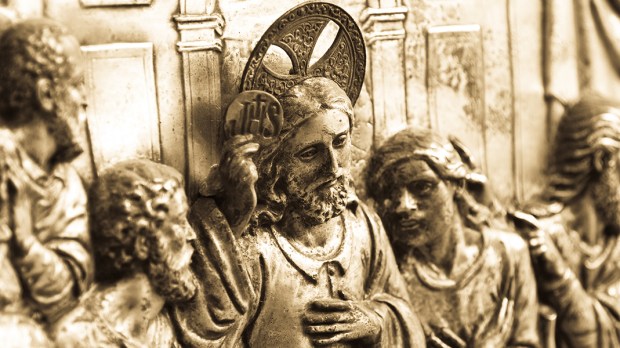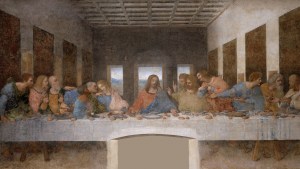I don’t recommend eavesdropping. But there have been major graces from “accidental” eavesdropping, if such a thing exists. St. Thérèse sorrowfully overheard her dad’s comments to her sisters after Christmas Midnight Mass, saying that night would hopefully be the last time he’d fill her shoes with presents. While she would have ordinarily reacted with distress, her heart experienced a flood of grace in her soul known as her “Christmas Miracle.” It was then she received the strength to leave her childish ways behind. Perhaps it was in eavesdropping that St. Nicholas heard about the desperation of a nobleman, ready to sell his daughters into prostitution, and was inspired to anonymously deliver gold at his door.
We have moments in Scripture where we seem to eavesdrop on Jesus’ sacred conversation with the Father. With their intimate bond that exists from all eternity, we know He doesn’t need verbal language to communicate with the Father. So if we find ourselves hearing the intimate conversation, then it must be because He wants us to hear it.
In the Upper Room with His apostles, aware that He is about to be taken from them, He pours His heart out to them. Suddenly there’s a shift, as He lifts His eyes to heaven and begins speaking directly to the Father, in front of everyone, about everyone (John 17:1)
He’s even taking about you and me — we who will come to believe through the words of others. What is the deep desire of His heart?
“That they may all be one; even as thou, Father, art in me, and I in thee, that they also may be in us … The glory which thou has given me I have given to them, that they may be one even as we are one, I in them and thou in me, that they may become perfectly one, so that the world may know that thou hast sent me and hast loved them even as thou hast loved me …” (John 17:20-23).
Jesus shares three times in two sentences that He wants us to be one, that is, He yearns for the communion of His mystical body through the sharing of the Divine Love between Himself and the Father. Things set in threes, Scripture scholars point out, are meant to be a vivid sign post, saying “Pay attention!”
This shows us that one of Jesus’ most intense desires for us is our communion, not only with Him, but with each other, who through Him have become our brothers and sisters.
Tradition says that St. John the Beloved, during his last days in Ephesus, had only one repetitive three-word homily to share: Love one another. Yet we can’t evade the truth uttered by Servant of God Dorothy Day (and spiritual masters throughout the centuries): “You love God as much as the one you love the least.”
This is a concrete (and difficult) beckoning to be my brother’s keeper. We know it’s a weighty task: to love the person at work who makes me feel inferior, or the family member I struggle to forgive, or the Sister in community who hurts me … it can seem like too much is being asked of me. And we can wonder, is it really possible to love this way? How do we love when it becomes so draining?
How?
The first secret is to lean on your union with Him, for it is only by Him that we can love. There’s a reason that St. Thomas Aquinas called the Eucharist the “Sacrament of Charity”: Not only is it an offering of Christ to the Father in perfect charity for us, but it is a charity that is shared with us through our union with Him in receiving His body, blood, soul, and divinity. Normally when we eat food, it becomes us. Rather, in the Eucharist, we become Him, given the grace to love as He loves. He delights in our trust in Him, especially when we have faith in His capacity to love others in us, despite our own weakness and lack of affection.
And second, before I can achieve union with another, I must first seek union within myself. Peace comes when my will is united with another, which won’t happen if I’m divided in myself. We can only come to love others and give a gift of ourselves if we are first self-possessed. Meaning, when we let the Lord heal our own discordant emotional life, we grow to let our intellect, informed by the true good, guide our emotions on the path of virtue. This is why, Bishop Fulton Sheen once said, the meek will possess the earth —because they have first possessed themselves.
St. Augustine said, “Try to acquire the virtues you believe lacking in your brothers. Then you will no longer see their defects, for you will no longer have them yourself.”
There’s a reason Jesus stops us from judging the speck in someone else’s eye while overlooking the large log in ours (Matt 7:5). When we take a healthy examination of our own weaknesses, and experience His healing grace, we become less preoccupied with the small flaws of others because our eyes see only Jesus and His desire for our sanctity. And if we do see the flaws of others, our hearts become softened by His mercy, desiring for them too to know His healing power.
He promises this is possible. For the love with which the Father has loved His Beloved Son has been given to us, and He too, is in us. (John 17:26).
In confidence, we can boldly claim His perfect yes to the Father, and call upon His perfect love for my neighbor to be outpoured through me, even when my own love seems mediocre. And we can pray to the Father in the words of St. Thérèse:
Since You loved me so much as to give me Your only Son as my Savior and my Spouse, the infinite treasures of his merits are mine. I offer them to You with gladness, begging You to look on me only through the face of Jesus and his heart burning with Love.


